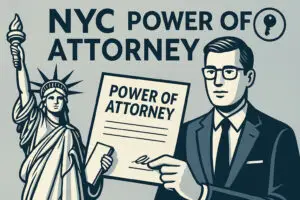4 Key Mistakes Executors Often Make During The Probate Process
At Morgan Legal Group, located in New York City, we specialize in estate planning, probate, elder law, wills, and trusts. Executors play a crucial role in the probate process, ensuring that a deceased person’s estate is administered and distributed according to their wishes. However, executors often make mistakes that can complicate the probate process and cause delays. This guide will help you understand four key mistakes executors often make and how to avoid them under New York State law.
1. Failing to Understand the Responsibilities of an Executor
Being an executor involves significant responsibilities, and failing to understand these duties can lead to costly mistakes. Executors are responsible for managing the deceased person’s estate, including paying debts, filing tax returns, and distributing assets to beneficiaries. Here are some common pitfalls:
Mismanaging Estate Assets
Executors must carefully manage the estate’s assets to preserve their value. This includes maintaining properties, managing investments, and protecting valuable personal items. Failing to do so can result in asset depreciation or loss.
Overlooking Debts and Taxes
Executors must pay the deceased person’s debts and taxes before distributing assets to beneficiaries. Overlooking these obligations can lead to legal complications and potential personal liability for the executor.
Ignoring Legal Requirements
Probate involves various legal requirements, including filing documents with the court and adhering to deadlines. Ignoring these requirements can result in delays, additional costs, and potential legal disputes.
2. Failing to Communicate with Beneficiaries
Effective communication with beneficiaries is crucial for a smooth probate process. Executors who fail to keep beneficiaries informed can create confusion, frustration, and mistrust. Here are some common communication issues:
Lack of Transparency
Beneficiaries have a right to know the status of the estate administration. Executors should provide regular updates and be transparent about the progress and any issues that arise.
Not Addressing Concerns
Beneficiaries may have questions or concerns about the probate process. Executors should be available to address these concerns promptly and clearly, helping to prevent misunderstandings and disputes.
Withholding Information
Withholding important information, whether intentionally or unintentionally, can lead to conflicts and legal challenges. Executors should ensure that all relevant information is shared with beneficiaries in a timely manner.
3. Misunderstanding the Value and Complexity of Assets
Executors often face challenges in accurately valuing and managing the deceased person’s assets, particularly when the estate includes complex or high-value items. Mistakes in this area can lead to financial losses and legal issues. Key considerations include:
Incorrect Asset Valuation
Accurately valuing estate assets is essential for tax purposes and fair distribution to beneficiaries. Executors should seek professional appraisals for real estate, valuable personal property, and unique assets.
Overlooking Hidden or Unusual Assets
Some assets may not be immediately obvious, such as digital assets, collectibles, or intellectual property. Executors should conduct a thorough inventory to ensure all assets are accounted for and properly managed.
Failing to Manage Investments Properly
Executors must manage the deceased person’s investments prudently to preserve their value. This includes making informed decisions about holding, selling, or reinvesting assets based on the estate’s needs and market conditions.
4. Neglecting to Seek Professional Assistance
The probate process can be complex and time-consuming, and executors who try to handle everything on their own often make mistakes. Seeking professional assistance can help ensure the process runs smoothly and efficiently. Here are some areas where professional help is beneficial:
Legal Guidance
Working with an experienced probate attorney is crucial for navigating legal requirements, preparing documents, and addressing any disputes that arise. Attorneys can provide valuable guidance and support throughout the probate process.
Financial Advice
Accountants and financial advisors can help executors manage the estate’s finances, including tax planning, debt management, and investment decisions. Professional advice can help optimize the estate’s financial position and ensure compliance with tax laws.
Appraisal and Valuation Services
Professional appraisers can provide accurate valuations of real estate, personal property, and unique assets, ensuring that the estate is fairly assessed and distributed. Executors should seek appraisals for high-value or complex assets to avoid disputes and financial losses.
How Morgan Legal Group Can Help
At Morgan Legal Group, we have extensive experience in probate law and are committed to providing compassionate and professional legal services. Here’s how we can assist executors in Nassau, New York:
Expert Legal Advice
Our attorneys provide expert legal advice to executors, helping them understand their responsibilities and navigate the probate process efficiently.
Comprehensive Document Preparation
We assist with preparing and filing all necessary probate documents, ensuring that the estate administration complies with New York State law.
Court Representation
Our attorneys represent the estate in court, handling disputes and ensuring that the probate process proceeds smoothly and efficiently.
Financial and Tax Compliance
We ensure that the estate complies with all tax laws, filing necessary tax returns and minimizing the estate’s tax liability to maximize the assets available for distribution.
Ongoing Support
We provide ongoing support to executors, helping them manage their responsibilities and address any issues that arise during the probate process.
Conclusion
Executors play a vital role in the probate process, and avoiding common mistakes is essential for a smooth and efficient administration of the estate. At Morgan Legal Group, we are dedicated to helping executors navigate the complexities of probate law and providing the best possible legal services. Contact us today to schedule a consultation with an experienced probate attorney and ensure that your loved ones’ estates are handled with care and expertise in Nassau, New York.
Frequently Asked Questions
What is probate?
Probate is the legal process by which a deceased person’s estate is administered and distributed according to their will or state law if there is no will. It involves validating the will, paying debts and taxes, and distributing assets to beneficiaries.
Why do I need a probate lawyer?
A probate lawyer provides legal guidance, prepares and files necessary documents, represents the estate in court, manages creditor claims, and ensures compliance with tax laws to facilitate a smooth probate process.
How long does the probate process take?
The length of the probate process can vary, but it typically takes several months to over a year, depending on the complexity of the estate and any disputes that may arise.
What happens if someone contests the will?
If someone contests the will, a probate lawyer can represent the estate in court, defend the validity of the will, and work to resolve the dispute in a fair and efficient manner.
Can a probate lawyer help with tax issues?
Yes, a probate lawyer ensures that the estate complies with all tax laws, files necessary tax returns, and helps minimize the estate’s tax liability to protect the assets available for distribution to beneficiaries.









